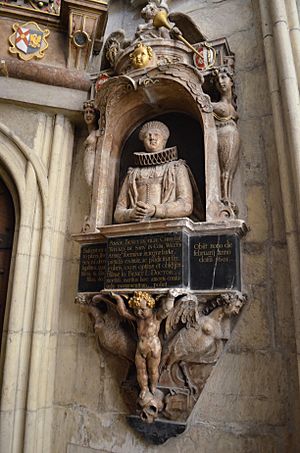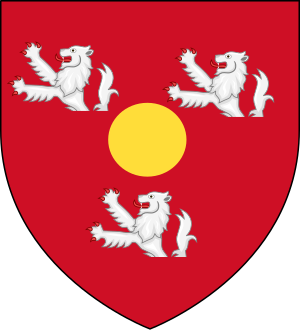John Bennet (judge) facts for kids

Sir John Bennet (born 1553, died 1627) was an important English judge and politician. He was a member of the House of Commons, which is like a part of today's Parliament. He served there from 1597 to 1621. His career ended with some problems because he was accused of taking too much money and charging unfair fees.
Contents
Sir John Bennet's Education
John Bennet was the second son of Richard Bennet and Elizabeth Tesdale. His mother was the half-sister of Thomas Tesdale, who helped start Pembroke College, Oxford.
John Bennet likely went to John Roysse's Free School in Abingdon. His family supported this school. He later started studying at Christ Church, Oxford in 1573.
- He earned his first degree (BA) in 1577.
- He became a Master of Arts (MA) in 1580.
- In 1583, he also got an MA from Cambridge.
- He returned to Oxford and became a proctor in 1585.
- He earned his law degrees (BCL and DCL) in 1589.
- The next year, he became a lawyer in the Court of Arches, a church court.
Sir John Bennet's Career and Public Service
Bennet started his career working for the church in the Diocese of York. He was likely helped by John Piers, who was the Archbishop of York. Bennet also worked in the exchequer court.
- In 1591, he got a church position in Langtoft.
- By 1594, he became a J.P. for the East Riding of Yorkshire.
- He also advised a group talking with Scotland about border safety.
- In 1599, he joined the Council of the North, an important government group.
Becoming a Member of Parliament
In 1597, Bennet was chosen to be a Member of Parliament (MP) for Ripon. In 1601, he became an MP for York.
- He was made a knight in 1603 by the King.
- Around 1603 or 1604, he became a judge for the Prerogative Court of Canterbury. This court handled wills.
- He kept his jobs in York until 1609 and 1624.
- He was elected MP for Ripon again in 1604.
While in Parliament, he tried to protect church courts. He also tried to stop a rule that would prevent married men from living in Oxford and Cambridge colleges with their families, but he wasn't successful. He was also part of important courts that heard appeals. In 1608, he became a Master in Chancery, another legal role. In 1611, he joined the council of Queen Anne, who was the wife of King James I.
Involvement with Oxford University
Sir John Bennet was very interested in Oxford University. Sir Thomas Bodley asked him to help raise money for the Bodleian Library, a famous library at Oxford. Bennet did a good job with this task. He was also one of the first leaders of Pembroke College, Oxford.
He was elected MP for Oxford University in 1614 and again in 1621.
Problems in His Career
During his time as an MP for Oxford University, a person named Richard Kilvert accused Sir John Bennet in Parliament. Kilvert said that Bennet was taking too much money and charging unfair fees in his work as a judge.
- Bennet said he was too sick to attend the debates.
- Parliament decided he should be removed from the House of Commons.
- His case was sent to the House of Lords, which is another part of Parliament.
- He was placed under house arrest.
When he appeared before the House of Lords, he admitted that he couldn't explain where about £4,000 of the money he handled had gone. He was released on bail, meaning he had to pay £20,000 if he didn't show up for court. He was also ordered to pay Oxford University £1,000 that he still had from Sir Thomas Bodley's estate, but he only paid £550.
When his case finally went to trial, Bennet's lawyers didn't present a strong defense. He was fined £20,000. However, later on, he was not sent to prison and was allowed to hold public office again. Some people even joked that Sir John Bennet's actions made Francis Bacon, another famous person who had problems with money, seem more honest.
Sir John Bennet's Family Life
Sir John Bennet was married three times:
- First, he married Alice Weekes. They had four sons and two daughters. Alice died in 1601.
- Second, he married Elizabeth Lowe, who was the daughter of Sir Thomas Lowe. Elizabeth died in 1614.
- Third, he married Leonora Vierandeels, who was a widow from Antwerp.
Sir John Bennet passed away on February 15, 1627. He was buried at Christ Church, Newgate in the City of London.
See also
- List of Old Abingdonians
Sources
| Parliament of England (to 1707) | ||
|---|---|---|
| Preceded by Anthony Wingfield |
Member of Parliament for Ripon 1597 |
Succeeded by Christopher Perkins |
| Preceded by James Birkby |
Member of Parliament for York 1601 |
Succeeded by Roger Askwith |
| Preceded by Christopher Perkins |
Member of Parliament for Ripon 1604 |
Succeeded by Sir Thomas Posthumous Hoby |
| Preceded by Sir Thomas Crompton |
Member of Parliament for Oxford University 1614–1621 |
Succeeded by Sir Isaac Wake |
 | Victor J. Glover |
 | Yvonne Cagle |
 | Jeanette Epps |
 | Bernard A. Harris Jr. |


